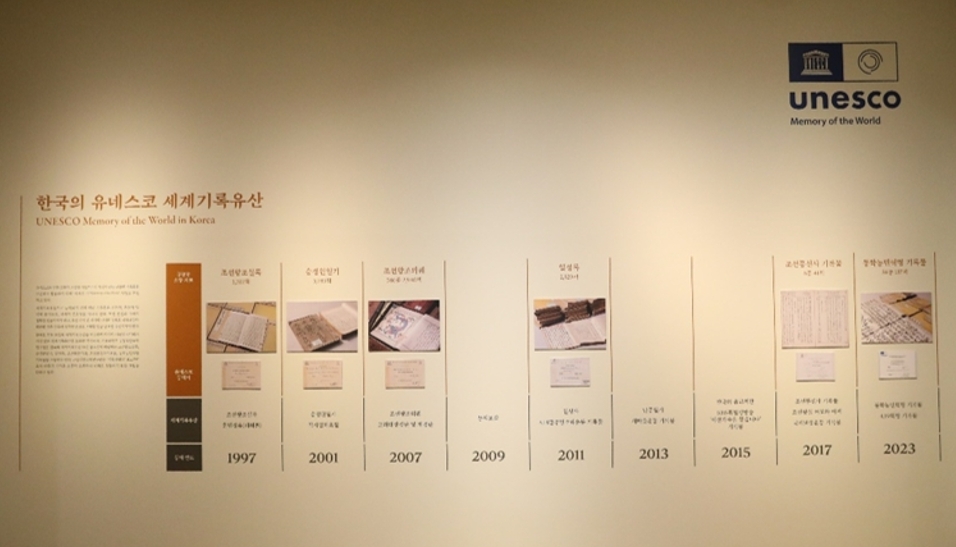In celebration of Korea's cultural legacy, the Kyujanggak Institute for Korean Studies’ (hereinafter referred to as Kyujanggak) special exhibition "Archives of Korea, Memories of the World'' invites visitors on a captivating journey into the heart of Korea's historical archives. This exhibition, inaugurated on January 29 and running until August 16, with weekday visiting hours from 10 a.m. to 5 p.m., commemorates the addition of the Archives of the Donghak Peasant Revolution to the UNESCO Memory of the World List in May 2023. With its distinguished collection, Kyujanggak proudly holds six of Korea's 18 UNESCO Memory of the World, offering a rare opportunity to explore the nation's vibrant past.

(Left) The opening event of the special exhibition, (Right) Commemorative performances by Chitadae
A vivid memory of the Joseon Dynasty
As they enter the exhibition, visitors are greeted by the Annals of the Joseon Dynasty, a testament to Korea's dynastic history spanning 472 years from the Taejo to the Cheoljong Dynasty. In the "Annals of King Chungjong," there is a command written, "Use this brush and ink to record all of my achievements without hiding anything." This reflects a distinctive feature found rarely in records published by royal dynasties worldwide, as its aims were not merely at praising the king but to objectively record facts. Despite compiling the "Annals of King Seonjo," efforts were made to preserve the original to enable future generations to assess its validity. At the exhibition, visitors can learn about the process of drying and airing the annals as well as information on the changing preservation methods of the annals over time.

(Left) The Annals of the Joseon Dynasty, (Right) Uigwe: The Royal Protocols of the Joseon Dynasty
Among the showcased documents is the ‘Seungjeongwon Ilgi, the Diaries of the Royal Secretariat,’ distinguished by shorthand drafts meticulously supplemented by the royal secretariat and later revised and used as reference materials for state affairs. Ilseongnok, “Records of Daily Reflections” means to reflect on oneself every day, and since the king himself read and revised it, the king's name is written in the first-person perspective. Uigwe, “The Royal Protocols of the Joseon Dynasty” contains detailed texts and pictures of various rituals and events, giving us a glimpse into the transparent and thorough recording spirit of our ancestors. “The Documents on Joseon Tongsinsa” illuminate diplomatic exchanges with Japan, highlighting a history of cultural coexistence and exchange.
"Without these materials, it would have been difficult to know what kind of society the Joseon Dynasty was," said Kim Hee-kyung, an academic art researcher, "The power of records is that we can directly see what happened daily and what values and issues were present in the past that transcended hundreds of years." "Although UNESCO has highly valued the records of our ancestors, we often don't realize their value as recipients," said Soo-Jin Choi (Department of Philosophy, 20), a docent who assisted with the explanation of the exhibit. "I hope we can spend some time thinking about why our ancestors wanted to keep these records and why they wanted to protect them during the war."

Description of UNESCO Memory of the World in Korea
The value of co-creating and sharing records
A focal point of the exhibition is the “Archives of the Donghak Peasant Revolution,” shedding light on the peasant uprising for freedom and equality from 1894 to 1895. Comprising mostly government records, these documents provide detailed accounts of the revolution's intentions and developments. Notably, the “Jeon Bongjun Gongcho” and “Gongsanchobigi” offer vivid portrayals of the uprising and ensuing battles, revealing the resilience and determination of Korea's people in pursuit of justice.
"If Kyujanggak holds many official documents of the ruling class, the Donghak Peasant Revolution Memorial Hall (located in Jeong-eup) holds records of the people," said Park Sung-il, an academic art researcher, when asked why this document was inscribed on the UNESCO Memory of the World List. "I think it is a valuable document in that it allows us to examine the political situation in the modern era from various angles." In response, Song Ji-hyung, an academic art researcher, added, "recently, heritage properties that are listed are often compiled from materials held by various organizations and given new meaning." “The Documents on Joseon Tongsinsa” are also archives, not documents that were organized at the time. The role of posterity's excavation and curation is becoming increasingly important in recognizing the value of the archives.

(Left) Archives of Donghak Peasant Revolution, (Right) Jeonbongjungongcho
In total, 20 student docents are involved in sharing the value of Korea's cultural assets. Every six months, the museum selects and trains volunteer docents, and each time, students from various departments actively apply. Meanwhile, the research center is also working on compiling the database of original materials, publishing research, education, and publication.
It is rare that a single institution can showcase such a rich heritage of UNESCO Memory of the World. "This is a rare opportunity, and we hope that students will come to the exhibition because it is located on campus and is free to the public," said a member of the Faculty of Arts and Research. By delving into historical archives, visitors gain invaluable insights into humanity's collective journey, encompassing both triumphs and tribulations. As guardians of Korea's cultural heritage, Kyujanggak Institute for Korean Studies continues to illuminate the past, inspiring present generations and guiding future endeavors.
Student Reporter
Choi Hayoung (Department of Linguistics)
harongeee@snu.ac.kr
Translated by
Seulki Yeo (Department of Russian Language and Literature)

